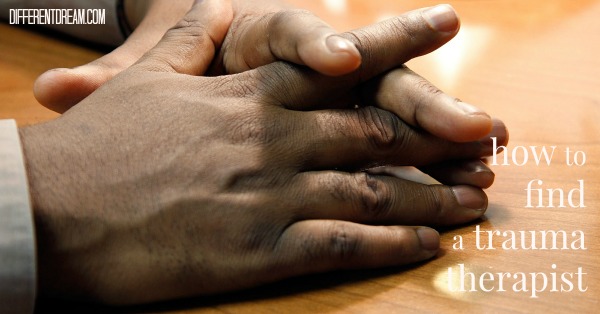How to Find a Trauma Therapist

Finding a skilled trauma therapist for parents who live with secondary trauma because of the stress experienced while raising children with special needs can be a challenge. However these steps can help parents who want healing to find trauma therapists in every area of the United States.
How to Find a Quality Trauma Therapist
Step 1: Ask Around
When you need to find an eye doctor, dentist, or a specialty doctor, you probably ask other friends or co-workers for recommendations. So why not follow the same strategy when looking for a trauma therapist? Be sure to ask people whose judgment you trust and then continue your search using steps 3–7 below.
Step 2: Use a Therapist Locator
If Step 1 proves fruitless, all is not lost. Psychology Today has a user friendly therapist locator at their website. Just type in your zip code and a list of therapists in your area will pop up. Another good therapist locator can be found at the Good Therapy website.
Step 3: Screen the List
Scroll through the list and jot down the names of therapists who meet these basic criteria:
- They have trauma-specific training.
- They do more than talk therapy (look for therapists who use hypnosis, Eye Movement Desensitization Reprocessing (EMDR), guided imagery, neuro-feedback, and play therapy rather than Trauma Focused Cognitive Behavioral Therapy (TF-CBT).
- They operate from a worldview consistent with yours.
Then go back and read through each profile and circle the names of therapists who meet your criteria.
Step 4: Call Your Insurance Company
Call your insurance company to find out which therapists are within your network. Cross off those who aren’t.
Step 5: Do a Phone Screening
Call the offices of the remaining names on the list. If a receptionist answers, find out when to call back to speak to the therapist directly. Ask questions about the types of trauma therapy they us, what training they’ve completed, what their fees are, how much is paid by insurance, and how long until an appointment can be scheduled.
Step 6: Visit a Therapist
Schedule a first visit with the person who rises to the top of your list. During that appointment, the therapist will conduct an intake assessment. If you like what you see, schedule a second appointment during which therapy will begin. But if you feel uncomfortable for any reason, move on to the next therapist on the list.
Step 7: Assess the Situation
If you visit the therapist for an hour a week, you should feel like you’re making progress in a few months. If no progress has been made after 3-6 months of treatment, find a different therapist.
How Did You Find a Trauma Therapist?
Have you found a qualified trauma therapist who has helped you deal with your trauma? Give them a shout out in the comment box and add more tips about how you found the right person.
Do you like what you see at DifferentDream.com? You can receive more great content by subscribing to the quarterly Different Dream newsletter and signing up for the daily RSS feed delivered to your email inbox. You can sign up for the first in the pop up box and the second at the bottom of this page.
By Jolene
Jolene Philo is a published author, speaker, wife, and mother of a son with special needs.
2 Comments
Submit a Comment
Subscribe for Updates from Jolene
Related Posts
Trauma vs. Trust
For special needs parents, figuring out trauma vs. trust becomes the difference between enduring life and enjoying it.
Flying Near the Sun as a Special Needs Parent
Guest blogger Lisa Pelissier explains how she copes when she is flying near the sun as a special needs parent.
How Can I Make You Feel Safe?
Whether your loved one suffers from trauma or dementia, the best question a caregiver can ask is, “How can I make you feel safe?”






Andrea, thank you for being discerning enough to broach the topic with your cousin’s family. Don’t be surprised if they reject the idea at first. It often takes several gentle and kind discussions before people are able to accept the concept and move into action. I’m praying it happens quickly for your family members. Jolene
I’m glad that you talked about asking recommendations from friends and family whose judgment you trust in finding a trauma therapist. One of my cousins got involved in a car accident and it left him a trauma and doesn’t want to mingle with other people outside their home. I will talk to his parents to consider trauma therapy for him.